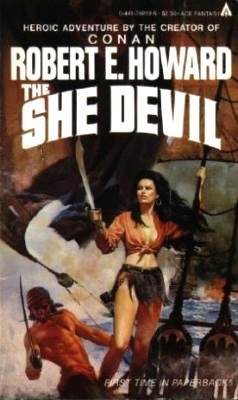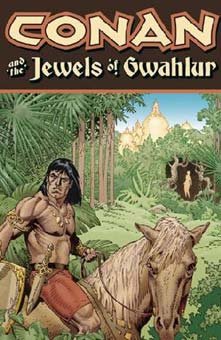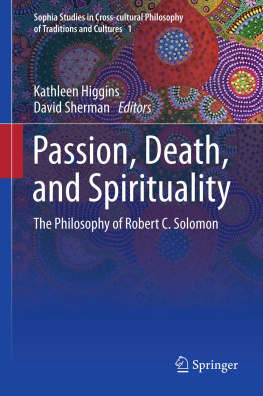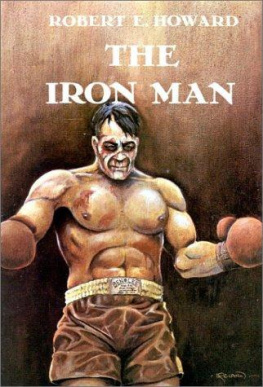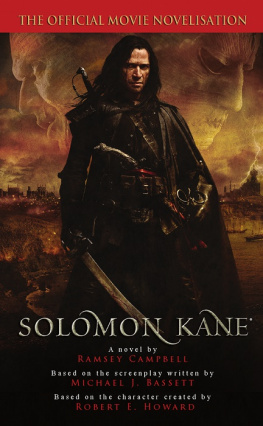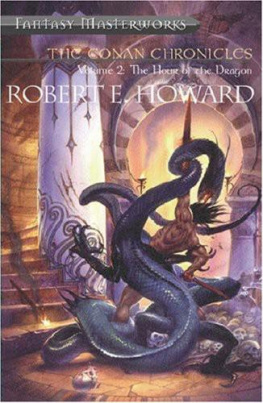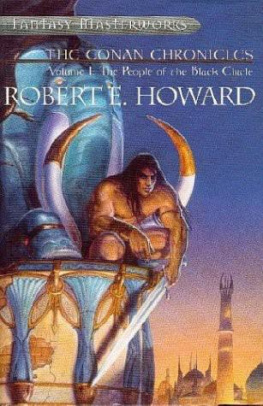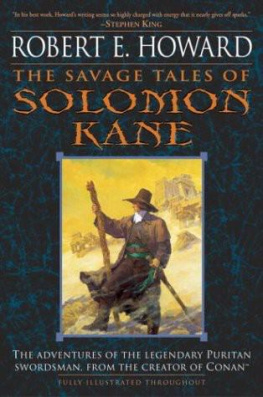

This book is dedicated to the memory of Father Joseph A. Kelly
Nulla dies sine linear
GARY GIANNI
Foreword
I have a confession to make.
I never read any of the Solomon Kane stories before I was asked to illustrate them.
I say this with great reluctance as it's generally assumed artists wish to illustrate the books which have made a lasting impression on them and I fear long-time aficionados might worry about my ability to do justice to Howard's material.
Granted I never knew Kane; but the spirit he embodies that of the romantic hero ah! Now I'm on fictional terra firma.
Robin Hood, Long John Silver, Captain Nemo, Tarzan, not to mention Conan these are the figures I grew up on. I know them well and along with millions of other readers, have thrilled to their exploits.
Solomon Kane is easily part of this tradition. I'm sure Howard would have agreed with me. Kane shares the same ingredients that bring all great fictional heroes to life action, poetry, drama, rich detailing and most importantly high adventure.
And who could do it better than Robert E. Howard?
As I finished reading the Solomon Kane stories, I was reminded how I used to feel after reading about some mysterious figure, how I wished I could be him.
And so, if there is still someone out there who hasn't read these wonderful stories, I envy you, you're in for a treat. For the rest of you revisiting Robert E. Howard's grim hero will be good for your soul.
Solomon Kane should appreciate that.
Gary Gianni
In Memoriam: Robert Ervin Howard
The sudden and unexpected death on June 11 (1936) of Robert Ervin Howard, author of fantastic tales of incomparable vividness, forms weird fiction's worst loss since the passin-g of Henry S. Whitehead four years ago.
Mr. Howard was born at Peaster, Texas, on January 22, 1906, and was old enough to have seen the last phase of southwestern pioneering the settlement of the great plains and lower Rio Grande valley, and the spectacular rise of the oil industry with its raucous boom towns. His father, who survives him, was one of the pioneer physicians of the region. The family have lived in south, east, and west Texas, and western Oklahoma; for the last few years at Cross Plains, near Brownwood, Texas. Steeped in the frontier atmosphere, Mr. Howard early became a devotee of its virile Homeric traditions. His knowledge of its history and folkways was profound, and the descriptions and reminiscences contained in his private letters illustrate the eloquence and power with which he would have celebrated it in literature had he lived longer. Mr. Howard's family is of distinguished southern planter stock of Scotch-Irish descent, with most ancestors settled in Georgia and North Carolina in the eighteenth century.
Beginning to write at fifteen, Mr. Howard placed his first story three years later while a student at Howard Payne College in Brownwood. This story, Spear and Fang, was published in Weird Tales for July, 1925. Wider fame came with the appearance of the novelette Wolfshead in the same magazine in April, 1926. In August, 1928, began the tales dealing with Solomon Kane, an English Puritan of relentless duelling and wrong-redressing proclivities whose adventures took him to strange parts of the world including the shadow-haunted ruins of unknown and primordial cities in the African jungle. With these tales Mr. Howard struck what proved to be one of his most effective accomplishments the description of vast megalithic cities of the elder world, around whose dark towers and labyrinthine nether vaults clings an aura of pre-human fear and necromancy which no other writer could duplicate. These tales also marked Mr. Howard's development of that skill and zest in depicting sanguinary conflict which became so typical of his work. Solomon Kane, like several other heroes of the author, was conceived in boyhood long before incorporation in any story.
Always a keen student of Celtic antiquities and other phases of remote history, Mr. Howard began in 1929 with The Shadow Kingdom, in the August Weird Tales that succession of tales of the prehistoric world for which he soon grew so famous. The earlier specimens described a very distant age in man's history when Atlantis, Lemuria, and Mu were above the waves, and when the shadows of pre-human reptile men rested upon the primal scene. Of these the central figure was King Kull of Valusia. In Weird Tales for December, 1932, appeared The Phoenix on the Sword first of those tales of King Conan the Cimmerian which introduced a later prehistoric world; a world of perhaps 15,000 years ago, just before the first faint glimmerings of recorded history. The elaborate extent and accurate self-consistency with which Mr. Howard developed this world of Conan in his later stories is well known to all fantasy readers. For his own guidance he prepared a detailed quasi-historical sketch of infinite cleverness and imaginative fertility now running in The Phantagraph as a serial under the title The Hyborian Age.
Meanwhile Mr. Howard had written many tales of the early Picts and Celts, including a notable series revolving round the chieftain Bran Mak Morn. Few readers will ever forget the hideous and compelling power of that macabre masterpiece, Worms of the Earth, in Weird Tales for November, 1932. Other powerful fantasies lay outside the connected series these including the memorable serial Skull-Face, and a few distinctive tales with a modern setting, such as the recent Black Canaan with its genuine regional background and its clutchingly compelling picture of the horror that stalks through the moss-hung, shadow-cursed, serpent-ridden swamps of the American far South.
Outside the fantasy field Mr. Howard was surprisingly prolific and versatile. His strong interest in sports a thing perhaps connected with his love of primitive conflict and strength led him to create the prize-fighting hero Sailor Steve Costigan, whose adventures in distant and curious parts delighted the readers of many magazines. His novelettes of Oriental warfare displayed to the utmost his mastery of romantic swashbuckling, while his increasingly frequent tales of western life such as the Breckenridge Elkins series shewed his growing ability and inclination to reflect the backgrounds with which he was directly familiar.
Mr. Howard's poetry weird, warlike, and adventurous was no less notable than his prose. It had the true spirit of the ballad and the epic, and was marked by a pulsing rhythm and potent imagery of extremely distinctive cast. Much of it, in the form of supposed quotations from ancient writings, served to head the chapters of his novels. It is regrettable that no published collection has ever appeared, and one hopes that such a thing may be posthumously edited and issued.
The character and attainments of Mr. Howard were wholly unique. He was, above everything else, a lover of the simpler, older world of barbarian and pioneer days, when courage and strength took the place of subtlety and stratagem, and when a hardy, fearless race battled and bled and asked no quarter from hostile Nature. All his stories reflect this philosophy, and derive from it a vitality found in few of his contemporaries. No one could write more convincingly of violence and gore than he, and his battle passages reveal an instinctive aptitude for military tactics which would have brought him distinction in times of war. His real gifts were even higher than the readers of his published work could suspect, and had he lived would have helped him make his mark in serious literature with some folk-epic of his beloved Southwest.
Next page

